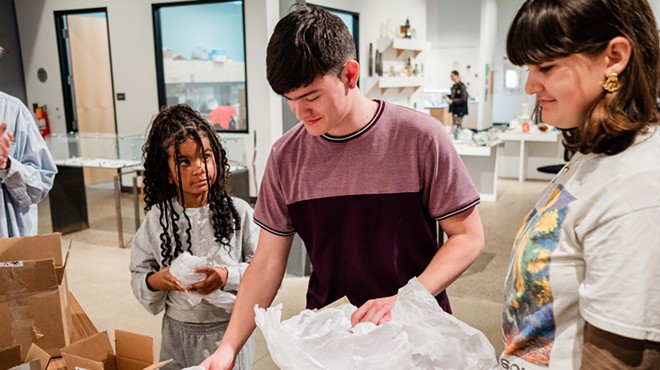Until fairly recently, I thought people were joking when they said they were saving a visual for their “spank bank.” Or rather, maybe not joking, but employing some kind of metaphor for what they would save if it were possible to have a Rolodex of images in their head. It didn’t occur to me that people do, in fact, store images in their heads. I didn’t know that a visual imagination was just that — visual.
Earlier this year, I embarked on a therapeutic journey that included experimenting with ketamine. As part of the process, after every session, I was told to journal about everything I experienced while on the medicine. I had such wild, expansive, and beautiful experiences that I wrote pages about the sensations I experienced in my body (including orgasm!) and the way that these experiences shifted my conceptualization of my life and relationships.
When I debriefed my experiences with my guide, it became clear that there was something notably absent from my telling. When she asked what I saw, I answered with, “What do you mean? I had an eye mask on, I saw black.”
It is not news to me that I don’t store information visually. My partner often has to remind me that I have met acquaintances that look wholly unfamiliar to me; if I have dreams, I certainly don’t remember them; before I had a car with a backup camera I parallel parked by playing bumper cars because my spatial awareness leaves something to be desired; and, I’ve written about my ambivalence regarding porn.
When I would hear people describe men as “more visual,” I assumed that they meant men were more shallow — or at least more concerned with appearances. I did not realize that what they were talking about was not a judgment about their character, but rather about the way their brains function. My disconnect, I think, stems from the fact that I couldn’t imagine that the way most people think, not just men, includes pictures.
It is estimated that between 2-4% of the population has aphantasia; or, in other words, the inability to form mental objects of things that are not present. Yet, in Donald Rumsfeld’s words, there’s a difference between “known unknowns” and “unknown unknowns.” That is to say, those who are reportedly part of the 2-4% know that they cannot picture things the way that most people can. Yet, this number may be artificially low given that there are surely many more, myself included, who for most of their lives didn’t realize that it was possible to do so.
Having never had the experience of forming images in my head, I have gone through most of my life not thinking about this at all. If I am missing out of something, I surely don’t know about it. Interestingly, though, I have started to think about what impact this has had on various aspects of my life, for good and ill.
At an event over the weekend, I ran into someone who also has aphantasia and he told me that an unexpected consequence of it is that a large number of people with aphantasia do not experience flashbacks from traumatic experiences. As someone who has experienced a fair amount of trauma, I asked myself: Have I ever had a flashback of any of these events? The very question belies the answer. I have not.
This realization caught me by surprise and made me wonder if my ability to function at a relatively high level for someone who has had so many intense things happen stems, at least in part, from a disability. Certainly, people who engage in disability justice will tell us that disabilities often also provide unexpected gifts. This is certainly one of them.
Moreover, while I don’t have a spank bank and can’t rely on porn to move me in any way, I also started to wonder if my disconnection from the visual also brought sexual gifts. As a sex worker, I’ve often had people ask me what I do when I see a client for the first time and am not attracted to them. Until I viewed this question through this lens, I was also puzzled by it, and not for the obvious reason (i.e., it’s a job and I’m not there to fulfill my fantasy). I was puzzled by it because I remember thinking, what does what they look like have to do with our sexual experience
Certainly, there are people who I find more attractive than others — I am not blind! But what I did recognize is that my judgment about whether they are aesthetically pleasing to me isn’t the most salient factor in what draws me in (or pushes me away). My sexuality, instead, is a deeply embodied experience. What I lack in visual imagination, I make up for through heightened tactile sensations (and perhaps also taste and smell). If you walk through the door, put your arms around me, and lightly kiss down my neck, I’m in. I will remember that feeling before I remember any details about your appearance.
When I fantasize, I fantasize about what my body feels like when wrapped in an embrace, what a tongue feels like as it brushes over my lips, and what fingertips feel like when they sink into my flesh. I imagine my body being stretched, and then filled, and then emptied. I imagine sweat running down my back and hot, sticky breath on my face and neck. These are very vivid feelings and memories that I store in my body and let wash over me when I’m alone in the dark. It is perhaps for this reason that the “blackness” of my ketamine experiences was so wonderful. In the absence of the visual imaginary that accompanies many folks’ experience with dissociatives, I had experience diving deep into my tactile memory. Indeed, I didn’t have to move a muscle to orgasm. I’m starting to think that I wouldn’t give that up for the ability to clearly picture an apple in my head.
You can find Jessie on her website or her socials: X: @sapiotextual & Instagram: @curvaceous_sage.














